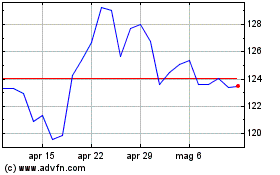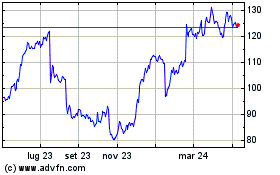Credit-Card Bond Issuance Hurt By New Accounting Rule
09 Novembre 2009 - 9:18PM
Dow Jones News
A new accounting rule is complicating the efforts of credit-card
issuers to raise funds in the asset-backed market, threatening to
undercut the nascent recovery in this corner of the debt world.
For these issuers, access to the asset-backed market, where card
loans are packaged into bonds and sold to investors, is critical.
It allows credit-card companies to raise money cheaply in order to
continue lending to consumers.
Card issuers, shut out of this market during the credit freeze,
have recently made inroads again with the help of government
efforts to kick-start consumer lending. But credit-card deals
plummeted in October, interrupting a comeback in still-fragile debt
markets.
An inability to tap the asset-backed market would be a further
setback to credit-card companies struggling with losses on souring
card loans and sweeping legislation that will take a bite out of
profits.
At the heart of the matter is a new accounting rule that
requires credit-card companies to bring back on to their books card
loans that are bundled into securities and sold to investors. This
change is fueling uncertainty on the treatment by a bank regulator
of these card loans once they return to the companies' balance
sheet. The concern is that once these credit-card securities return
to the books, they are a part of the assets that may be seized by
the Federal Deposit Insurance Corp., in the event the regulator
takes control of a card issuer's troubled banking unit. This added
wrinkle has companies, credit-ratings firms and investors
questioning the fate of these securities should such an event
occur.
To try to clear up the matter, the FDIC has scheduled a board
meeting for Thursday.
"The change in the accounting for securitizations has had the
unintended consequence of limiting the ability to get the required
ratings needed to support current and future issuance of credit
card asset-backed securities," said Roger Hochschild, president and
chief operating officer at Discover Financial Services (DFS). "My
hope is that the FDIC will act quickly to solve this issue so that
recent improvements in the asset-backed market can continue."
Under the old accounting standard, card issuers--such as
Citigroup Inc. (C), Bank of America Corp. (BAC), American Express
Co. (AXP), Capital One Financial Corp. (COF), JPMorgan Chase &
Co. (JPM) and Discover--would package pools of credit-card loans
and sell them to investors. Until now, these securities haven't had
to be included on the banks' balance sheets, so they haven't been
subject to the same accounting standards and disclosures required
for on-balance-sheet items.
But critics argued that this rule allowed companies to hide
risky assets in these off-balance-sheet items. The new rule will
force card issuers to bring off-the-books credit-card loans onto
their balance sheets and set aside additional reserves to account
for potential losses in these securities.
But bringing these card loans back on to the companies' books
also raises questions about how these assets will be treated if the
FDIC seized the card issuer's troubled bank.
"It amplifies the linkage between ratings on asset-backed
securities and the credit strength of the bank sponsor," said
William Black, an analyst at Moody's Investors Service. "If left
unresolved, it's introducing an incremental risk that could have a
negative rating impact on asset-backed securities. Most affected
will be lower-rated bank sponsors."
So-called lower-rated bank sponsors are the ones with ratings
lower than Aa3--the fourth-highest credit ranking--as defined by
Moody's. This includes the card-issuing entities of Citigroup,
American Express, Discover and Capital One.
The FDIC could issue guidelines Thursday on the accounting-rule
change, which will include the grandfathering of existing
credit-card securities so as to minimize the disruption caused to
the issuance of such deals. The FDIC declined to comment ahead of
its decision.
"Until credit-card issuers, investors and rating agencies see
revisions to the existing rule, they cannot issue new deals, which
will leave less credit available for consumers," said Tom Deutsch,
deputy executive director of the American Securitization Forum, a
trade group.
No new credit-card-backed bonds have emerged in the market since
Bank of America issued a $300 million deal on Oct. 2, according to
the trade publication Asset-Backed Alert. No credit-card securities
eligible for funding under the Federal Reserve's Term Asset-Backed
Securities Loan Facility, or TALF, have surfaced since
September.
Year-to-date issuance of securities made up of credit-card loans
has fallen 41% to $32.3 billion from $55.2 billion a year ago,
according to a Deutsche Bank note published on Nov. 5.
In the short run, there could be "some degree of paralysis until
issuers, investors and rating agencies can be certain of the
capital implications and insolvency treatments of a new
securitization," said Katie Reeves, an analyst at Deutsche Bank, in
the note.
-By Aparajita Saha-Bubna, Dow Jones Newswires; 617-654-6729;
aparajita.saha-bubna@dowjones.com; and Anusha Shrivastava, Dow
Jones Newswires; 212-416-2227; anusha.shrivastava@dowjones.com
Grafico Azioni Discover Financial Servi... (NYSE:DFS)
Storico
Da Giu 2024 a Lug 2024

Grafico Azioni Discover Financial Servi... (NYSE:DFS)
Storico
Da Lug 2023 a Lug 2024
